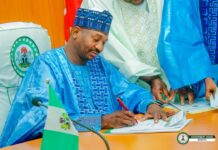By Abdallah el-Kurebe
Melinda Gates, Co-Chair of the Bill & Melinda Gates Foundation has said that Africa’s Growth Domestic Product (GDP) was growing faster than any continent, courtesy of Agriculture.
Gates said in a release from the Foundation that, “Africa’s GDP is growing faster than any other continent’s. When many people think about the engines driving that growth, they imagine commodities like oil, gold, and cocoa, or maybe industries like banking and telecommunications.
She tells of Joyce Sandir’s story which demonstrates agriculture as crucial to Africa’s future where farmers make up 70% of Africa’s workforce.
“They are the foundation of its economy, and the key to triggering its broader growth. Research shows that increasing agricultural productivity is the most effective way to reduce poverty in sub-Saharan Africa.
“In fact, agriculture offers the continent its best opportunity to turn a vicious cycle of poverty into a virtuous cycle of development. That is why leaders and policymakers from across the continent have declared 2014 Africa’s Year of Agriculture and Food Security,” Gates added.
“Joyce is a farmer who grows bananas, vegetables, and maize on a small plot of land in rural Tanzania. When I met her in 2012, she had just harvested her first crop of maize grown from a seed specifically adapted for Tanzania’s climate,” she said adding that the woman’s story was relevant for the reason that “Joyce is important to Africa’s future not only because she is a farmer, but also because she is a woman.”
Gates further said that she understands ways by which women and girls in Africa drive development forward by investing in their children’s nutrition, basic health, and education – and also by providing farm labour.
“What I am now learning is that if Africa hopes to spark an agricultural transformation, countries will first need to remove one of the main barriers holding the sector back: a pervasive gender gap.
“This gap is not about the number of women farmers. In fact, roughly half of Africa’s farmers are women. The gap is one of productivity. Across the continent, farms controlled by women tend to produce less per hectare than farms controlled by men,” she stressed.
She noted that the world has had evidence of this gender gap since 2011 but with limited data about its scope, shape, and causes. “The gender gap is real, and in some cases it is extreme. When we compare male and female farmers with similar land sizes across similar settings, the productivity gap can be as high as 66%, as it is in Niger.”
However, she became appreciative that “the new data do not just map the complexity and depth of the problem; they also point to concrete opportunities to develop gender-responsive policies that will help unlock the promise of all of Africa’s farmers.”
Gates suggested not only teaching agricultural extension workers how to make their messages more relevant to female audiences, or encouraging them to visit when women are most likely to be at home but also “increasing women’s access to markets, or introducing labor-saving tools to help them get the highest yield from their land.
“It will require African policymakers to start recognizing women farmers as the essential economic partners that they are,” she added.
Agriculture Making Africa’s GDP Grow Faster than Any Other Continent ,Says Gates
Follow Us On WhatsApp



